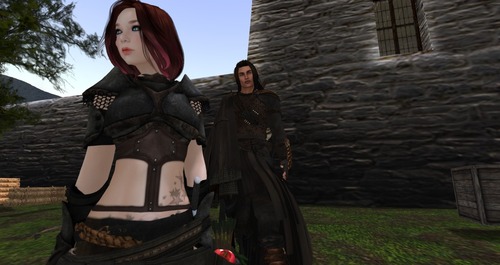- An Introduction to Role-playing in Second Life
- Location Scouting in Second Life
- Determining a role-play event in Second Life
- The fashionista - A Second Life Role-Play Archetype
In the first part of my blog post series on role-playing in second life I have pointed out why Second Life is a promising platform for virtual role-playing games (RPGs): the SL regions can be modeled to immersive settings and worlds. We are visually experiencing the fantasy world that we are playing in while our avatars are visually embodying our role-playing identity.
 |
| I am dressed up for a visit at the fantasy RPG-sim "Realm of Estara" |
Second Life RPG players do however also face some obstacles when it comes to determining decisions how the story continues. Traditional pen-and-paper role-play setting are characterized by a team playing together against enemy forces. These forces were represented by a game master. He or she was telling the story and sending in the enemies. The aim of the game master was to provide as much challenges as possible while leading the players to a happy-end of the story.
In Second Life there are multiply players in a RPG world, but there is (usually) neither a game master nor a predefined playable story-line with NPCs (non player-characters). In order to develop interesting stories the players assemble in competing groups with different backgrounds and interests - and these groups will follow their diverse aims during the role-play. Players are therefore usually not exclusively playing in a team against a common enemy. They are often competing with each other.
The next hurdle in the SL RPG world is that - while Second Life is a splendid visual environment for RPG areas - the SL viewer and its user interface hasn't been designed for gaming or role-playing.
 |
| Eve Dimitriaski is playing an Orc - I never knew that Orcs could look so cute. |
How can Second Life role-players achieve a good role-play experience with such restrictions? The first rule is setting up a tight set of rules by which the RPG communities are self-governed. A few years back Hamlet Au wrote on his New World Notes blog:
You can get an immediate sense of these rules by the qualifiers written in the very group description. If a community advertises itself as being constituted with a certain attitude towards roleplaying ('relaxed', 'strict', 'enforced', 'easygoing', 'not required' are often used as descriptors, for instance), then the players have a certain attitude towards roleplaying going into the game. That also means bumping up against the often invisible boundaries of what's considered "in character" (and therefore encouraged) and "out of character" (sometimes grounds for penalty).
Some RPG communities in Second Life allow 'freeform' roleplay where anyone can pick up the story and investigate and take away their own experiences and meanings to the events that unfold. There you have the choice to take up the clues or leave them and there is no general rules to it. Some other RPG communities prefer 'prearranged' roleplay, where the participants of the RPG are told whats generally going to happen, who's involved and what the rules are. There are also RPG communities that allow both ways of role-play. And both forms of role-play have in common, that participants determine the actions of their characters based on their self-characterization.
 |
| Some role-play events in the SL-RPG "Realm of Mystara" are determined by virtual dicing |
But what happens if two players don't agree on the outcome of a conflict? Or if there is a competition and the winner will take away an advantage? In pen-and-paper role-play games each action succeeds or fails according to a system of rules and guidelines. In Second Life there are the following ways to determine the result of a situation with multiple possible results:
- The players agree upon an outcome after discussing the situation in an out-of-character chat.
- They use virtual dices to define the outcome.
- The players refer use a scripted RPG hud that establishes the outcome by rules, character attributes and chance
- The players use a full hud combat system that allows the avatars to fight with each other like in a real fighter game (DCS, CSS, melee systems, etc.)
These four options are the different systems that I know of and that I have used in my Second Life roleplay. As the controls for avatar actions in SL are quite clumsy, I personally prefer the first three ways of determening the outcome of a competition in RP. Which system do you prefer for determening the fights or the outcomes of special events in your Second Life RPGs and how satisfied are you with your system?
No comments:
Post a Comment